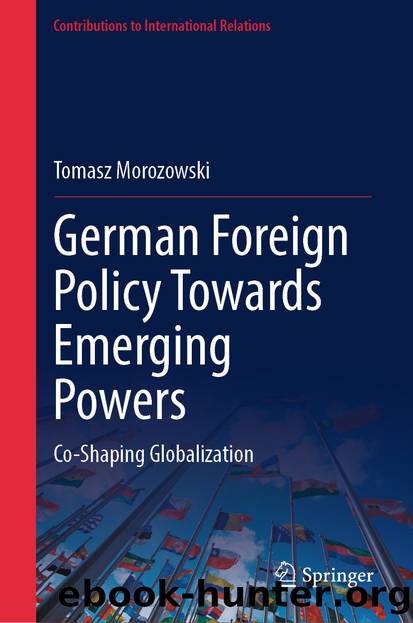German Foreign Policy Towards Emerging Powers by Tomasz Morozowski

Author:Tomasz Morozowski
Language: eng
Format: epub
ISBN: 9783031687938
Publisher: Springer Nature Switzerland
The states mentioned explicitly in the document (as examples of partners for Germany in particular areas of cooperation, or countries fulfilling the role envisioned for them) included Egypt, Argentina, Brazil, Chile, China, India, Indonesia, Kazakhstan, Qatar, Colombia, South Korea, Malaysia, Mexico, Nigeria, Singapore, South Africa, the United Arab Emirates, and Vietnam. As Westerwelle pointed out in parliamentary discussion, this was not an exhaustive list of shaping powers (Bundestag, 2012c, 18765). This choice of target states also met with a negative reactionâaccording to Frithjof Schmidt (Alliance 90/The Greens), the withholding of the shaping powers label from other unmentioned countries demoted them to second-class status in international politics, and therefore the use of that term was a diplomatic mistake (Bundestag, 2012d, 19030).
Opposition MPs, particularly from the SPD, also accused the programme of failing to address the increased role of new regional structures of international cooperation, such as the African Union (AU), ASEAN, and the Arab League (Bundestag, 2012c, 19039). It should be noted that the document did in fact include a provision (in the description of the first area of implementation: Peace and security) concerning partnerships that Germany ought to conclude with states and regional organisations, including the AU and Arab League (AA, 2012, 22).
A significant topic in the parliamentary debate was the role of Saudi Arabia as an addressee of the shaping powers programme, in the context of German arms exports to that country. Opposition MPs (Rolf Mützenich of the SPD, Kerstin Müller of Alliance 90/The Greens) spoke critically of German cooperation with Saudi Arabia, expressing doubts as to the criteria for the federal governmentâs classification of that country as a shaping power and the prospects for building a coalition of interests with such states (Bundestag, 2011, 17260; 2012d, 19033â36; 2013b, 31767). Westerwelle and other coalition MPs speaking in the debate did not give a direct answer to the above questions. Referring to the problem that the political and social models of some of the shaping powers did not meet the standards expected by Germany, Rainer Stinner (FDP) said that Germany had to âlearn to live with systemsâ that developed their own legitimisation in a manner different from the European one, and without following the secular state model, for example. He saw this as a âlearning processâ initiated by the shaping powers programme (Bundestag, 2012d, 19024â31), as a result of which Germany had to accept that demanding that other states take on greater responsibility meant accepting the fact that those states might do so in a manner that did not align with German visions.
Despite the fact that, as should be pointed out, Saudia Arabia was not explicitly mentioned in the document âShaping GlobalizationâExpanding PartnershipsâSharing Responsibilityâ, the debate about the possibility of that stateâs being included among Germanyâs global partners was a reflection of the broader considerations on the tension between economic interests and civil values.
Tension between Economic Interests and Civil Values
The document âShaping GlobalizationâExpanding PartnershipsâSharing Responsibilityâ was also criticised for concentrating excessively on economic interests, while taking insufficient account of the traditional values of German foreign policy.
Download
This site does not store any files on its server. We only index and link to content provided by other sites. Please contact the content providers to delete copyright contents if any and email us, we'll remove relevant links or contents immediately.
Spell It Out by David Crystal(36118)
Life for Me Ain't Been No Crystal Stair by Susan Sheehan(35811)
Cecilia; Or, Memoirs of an Heiress — Volume 1 by Fanny Burney(32559)
The Great Music City by Andrea Baker(32020)
Cecilia; Or, Memoirs of an Heiress — Volume 2 by Fanny Burney(31957)
Cecilia; Or, Memoirs of an Heiress — Volume 3 by Fanny Burney(31943)
Professional Troublemaker by Luvvie Ajayi Jones(29668)
The Secret History by Donna Tartt(19096)
We're Going to Need More Wine by Gabrielle Union(19049)
Twilight of the Idols With the Antichrist and Ecce Homo by Friedrich Nietzsche(18638)
All the Missing Girls by Megan Miranda(16034)
Cat's cradle by Kurt Vonnegut(15361)
Pimp by Iceberg Slim(14513)
For the Love of Europe by Rick Steves(14144)
Bombshells: Glamour Girls of a Lifetime by Sullivan Steve(14077)
Talking to Strangers by Malcolm Gladwell(13374)
Norse Mythology by Gaiman Neil(13371)
Fifty Shades Freed by E L James(13244)
The Social Justice Warrior Handbook by Lisa De Pasquale(12191)
